#decolonizing agriculture
Text
My (recently wealthy) older sister and her husband bought some land and got ducks and they have this big plan to grow crops and sell produce and she keeps talking about "homesteading" 🤢 and since she lives in an overwhelmingly white community it's unlikely any of her farm friends are gonna call it out, so I keep meaning to like. Look up some books to gift her for xmas that offer better terminology and an At Minimum Less Colonial perspective and introduction to the concept of a voluntary land tax/land acknowledgement before she gets into this stuff too deep and starts making money off it (bc I know she won't take it on my authority) and I keep forgetting to google resources. So this is both an accountability post for me to not forget to do this but also a request for recommendations if any of y'all have some tyyyyy
#how should i tag this hm#book recommendations#decolonization books#decolonizing agriculture#uhhh#subsistence farming#hobby farming#thats the thing tho is like#why cant she just call it hobby farming her animals are pets and her home is barely outside of suburbia#anyway#shes *famously* resistant to unsolicited advice so i want to come at this tactfully#indigenous knowledge#voluntary land tax#farming resources#permaculture#against my better judgement i will add the#homesteading#tag#but also 🔫 block on sight to anyone with even a whiff of weird energy
71 notes
·
View notes
Text
The most significant environmental problems that have resulted from the drive to repair drylands and to extract value include salinization from overirrigation, inappropriate “reforestation,” the extension of agriculture into marginal lands, and failed range “improvement.” Although these forms of dryland degradation became problems early in the colonial period, they all persist and continue to pose significant problems today. Of the relatively few contemporary cases of serious dryland degradation, the vast majority are found in places with strong political economic forces shaping development, such as capitalist expansion, authoritarian rule, and the developmentalist state. These cases are also directly tied to the devaluing and suppression of indigenous production systems and the local knowledge of dryland populations, often based on the assumption that they have ruined the land.
In a very real sense, our old fear of desertification has caused dryland degradation where, for all intents and purposes, none existed before. Some scholars have dubbed this “policy-induced desertification.”
185 notes
·
View notes
Text
I realized that if I'm disappointed in the transmission of real information about Sudan and the Congo, I can just make the posts myself!
I am not surprised that people haven't been provided a strong understanding of the violence in the global south, but I *am* mad about it.
So let's talk about Sudan and the Congo
Since 2003 or so, an estimated 450,000 Sudanese refugees have fled to Chad, looking for safety from routine waves of ethnic cleansing committed by the Rapid Support Forces and their state/civilian allies.
While the Massalit make up the majority of those attacked, many other ethnicities are included amongst victims. It is NOT a religiously motivated cleansing, as most of those being victimized as well as most of those doing the victimizing are Muslim, and communicate the foundations of the violence as being the result of ethnic-cultural divides in the region current social system. Many of those speaking against the ethnic cleansing occurring agree, and also add that economic interactions appear to be major driving factors in who is targetted and when.
The Congo, meanwhile, has been going through it's own ethnic cleansing. One that has been more or less ongoing since 1996. An approximated 6mil people have been killed since.
Due to this relationship between economic motives and targets, ongoing desertification has been exacerbating violence in the region for years by making resources scarcer, more precious, and less stable to access.
The primary factors being credited with responsibility for this desertification and resultant resource volatility?
Climate change and human impact on the environment (via societal features such as urbanization, agriculture, waste management services, social welfare services, deforestation and bush removal, etc)
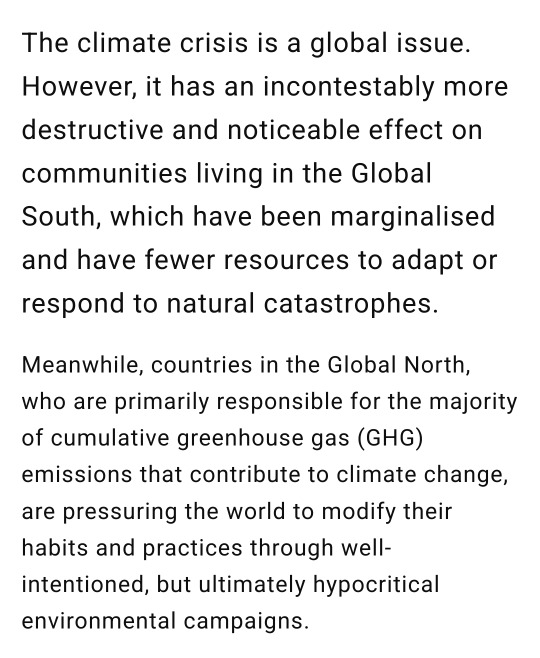
From FairPlanet ^
Funny how the global north causes lethal climate change but the global south is forced to die from it.
Funny how the global north forces the environmental recovery conversation to avoid study of environmental imperialism and remain solely focused on "incremental changes that can protect future generations". Whose future generations? What about the people dying NOW because of environmentally toxic industries??
And Nasreldin Atiya Rahamtalla via the International Journal of Social Sciences and Conflict Management says the following:

Hmm, I wonder why local power and social welfare infrastructure in Sudan and especially in Darfur might be diminished from previous governance:
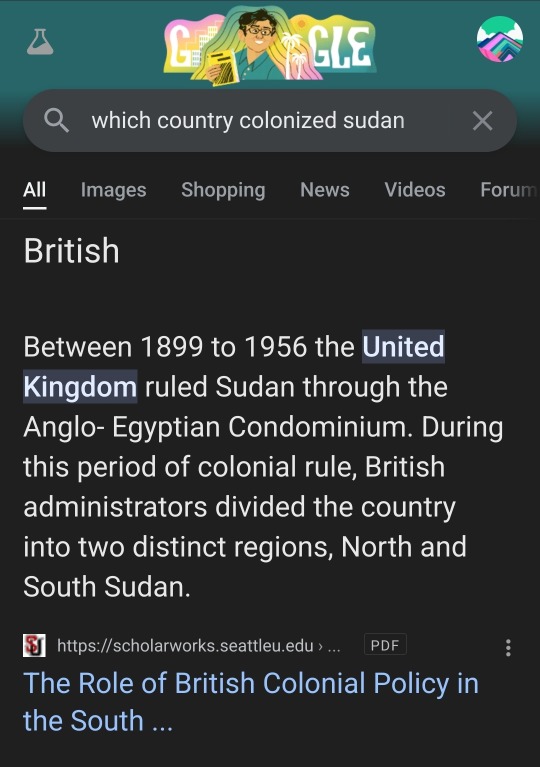
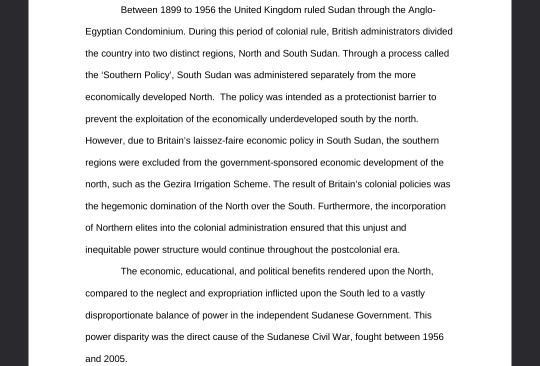
It's almost like the British had a habit of pitting different regional communities against each other along enforced ethnic lines while pillaging some and sparing others, then blowing the whole governance network in a temper tantrum on their way out the door during decolonization, a method of inflicting one last violemt devastation and sabotage peaceful futures most often epitomized by Rwanda and the Belgian Empire:
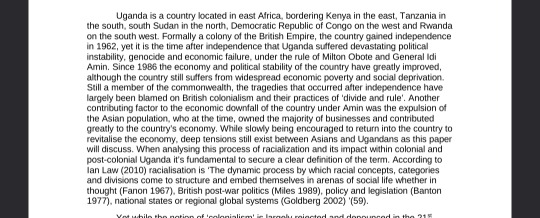
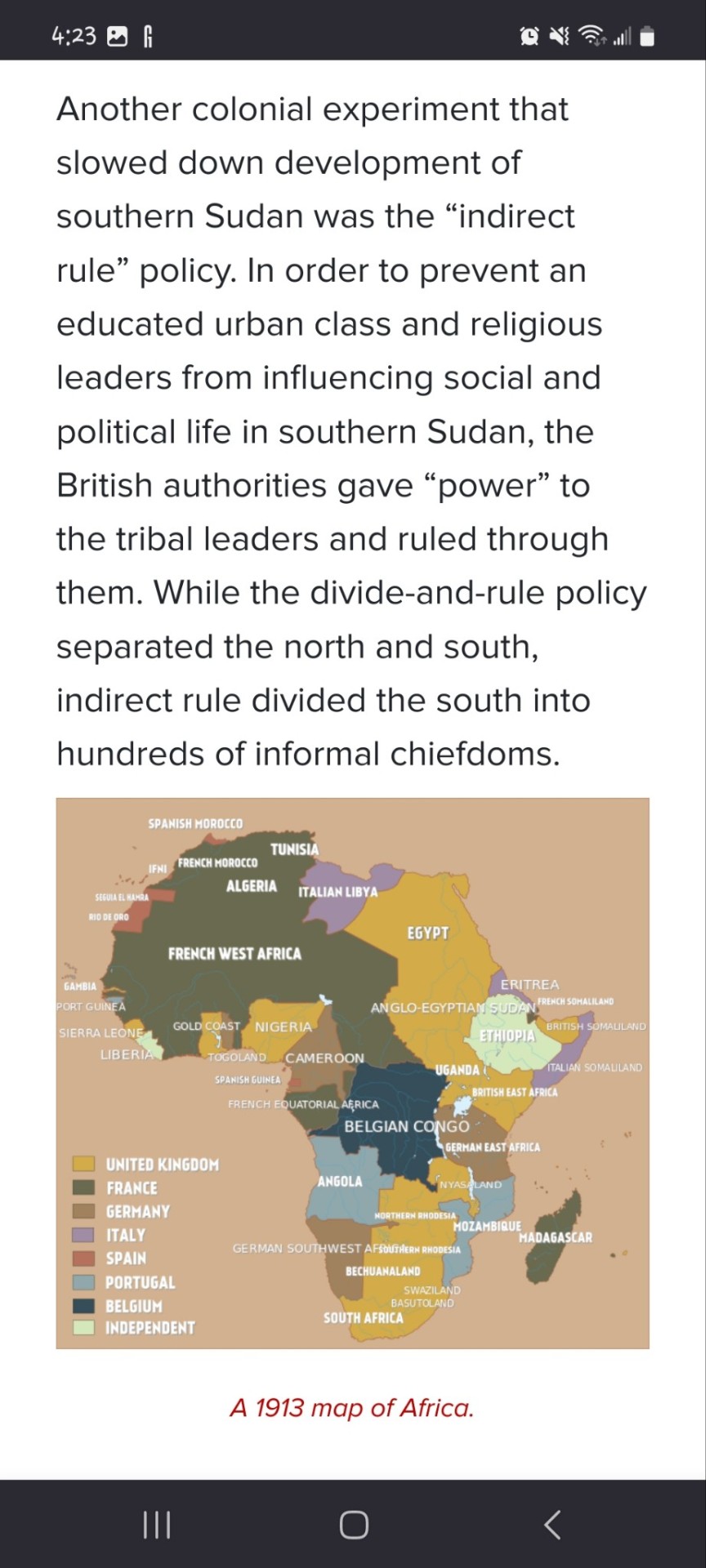
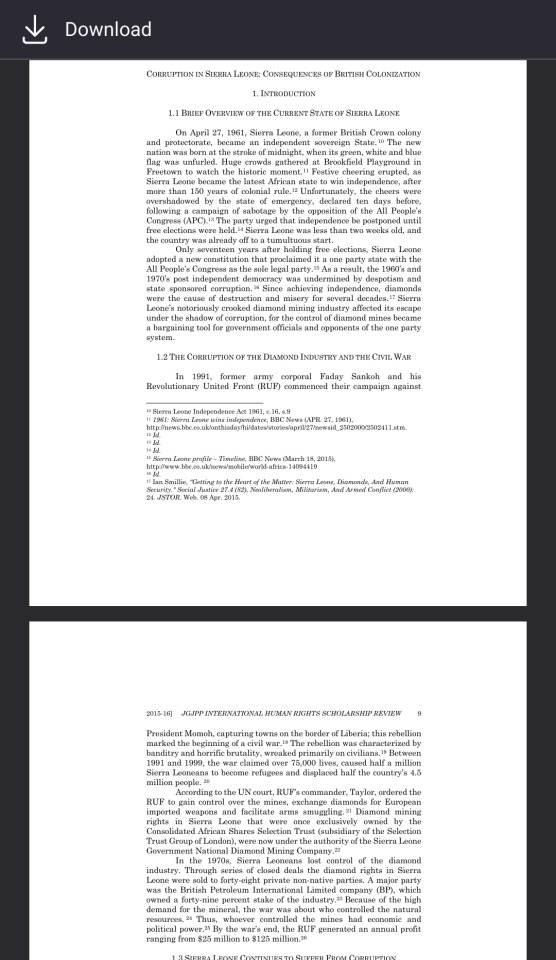
It's almost like the imperialist businesses that feed off African continental resources and were installed during colonization as a form of economic imperialism were often THE ONLY PARTS of the social system left largely functional after withdrawal and "decolonization". It's almost like imperialism and colonization never actually stopped!!! It just??? Changed shape ☆->¤ still a fuckin crime against humanity my guy!!! Especially when child slaves are dying in your mines!!!
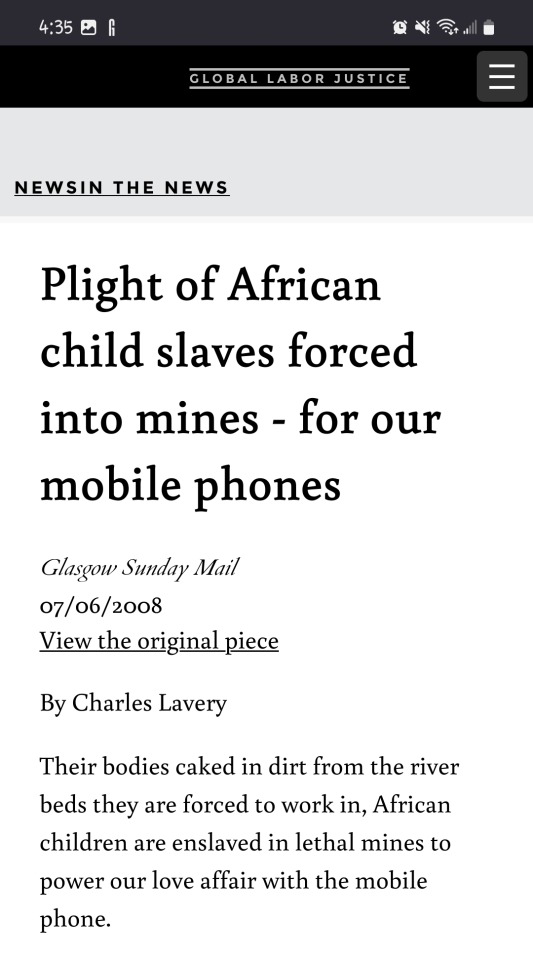
Sudan's economic imperialism comes in the form of Blood Diamonds! You know. The reason that none of us are buying earth mined diamonds anymore when lab made are literally the same goddamn thing RIGHT????????
Oh! They also have oil. The thing we're using to fuel our climate change machine. The climate change machine that's KILLING THEM.
And unfortunately for those of us with Nickel allergies, gold and silver have the same problem. If you haven't already switched to surgical steel, you might wanna. Of course, then we're right back to climate change since steel production allegedly creates a whopping 7% of global emissions due to relying on coke (coal) as a fuel source. So. I dunno really. I like my jewelry as much as anyone. But do I like it enough to know people are dying so I can have it?????
Not really. I'd rather save that risk addition for surgical steel being used in ACTUAL surgeries like the plates, pins, and screws that reattached my foot, or the replacement knee joint that my mom got. At least until we have a body-safe material for these things that ISN'T a source of devastation in the global south.
My point is, basically, that historically militerized conflict almost always stems, at least, in part, from efforts to control resources. It's the most timeless reason to go to war. To make sure you and the people you care about can guarantee themselves access to survival need-meeting. As consumerist and capitalist societies, it is DEEPLY important that we understand the price we ask other people to pay for our luxuries. For our right not to be made uncomfortable by too much radical change too quickly. We need to make that causal link A LOT more visibly explicit and unavoidable, because as it stands, allowing the hierarchy to go unspoken is going to kill billions.
I don't want that on my hands.
I highly recommend learning what civil disobedience and mutual aid infrastructures of care look like. How can we hold corporations (and the individual people who work there) accountable for the countless deaths directly attributable to their profit margins? How can we maximize our local resource distribution to ensure everyone has what they genuinely need to survive, even if that means we take a little less from the community resources for ourselves, or we have to give up things that can't be fully replaced by regionally sustainable alternatives.
I promise that we will adapt.
The dead can't.
67 notes
·
View notes
Text
Colonialism never ended

Okay, let me talk about one thing that a lot of white folks don't quite seem to realize. And that is the fact that colonialism never really ended.
Like, the official telling of it was: "Oh, yeah, after world war 2 the colonizing nations realized it was wrong." Or, if it is more honest, then: "Yeah, after world war 2 the colonizing empires were out of money to uphold her colonies." But even that still very much is a total lie. We still live under colonialism - both settler colonialism and extractionist colonialism.
Probably the easiest way to realize, we still have settler colonialism in place, is to look at the amount of land that never was in any way or form given back to the indigenous folks who once called it their home. No, they do not get to live there again. And also, no, they will not see a penny of the money that might be extracted from their former homes through development, agriculture or for example oil extraction.
In the US the state that shows it maybe the strongest is Hawai'i, in which indigenous folks are more and more pushed away from where they were living and praying, as parts of the island get used for tourism, rich people homes, military stuff or maybe a nice observatory on one of their sacret sights. More and more indigenous Hawai'ians are forced to move away from Hawai'i. Because through the rich folks and their development, they cannot afford to live on their own islands any longer.
We also see it through extractions. I already spoke about the land in the USA, but the same is happening in so many other places. A lot of land (especially mines) all over Africa are still owned by white people directly or indirectly. So they will still, to this day, extract the wealth from it.
Or, heck, we have all those exotic fruit plantages all over the tropical regions. Like how the US literally overthrew a government to keep the banana productions going and keeping it in white people hands.
Or there is of course the fact that the fucking lines onf the maps we have now have been drawn by white people, artificially grouping people together, who might not even be from the same culture. Something that often instabilized nations - an outcome that was very clearly intended, to make it easier to control and extract value from the nations in question.
Just look at the entire thing with the Sykes-Picot-agreement, that is responsible for so many of the wars happening in the Arabian world right now. Or at the division of India, that was and still is cause for so much violence.
And of course, while Slavery is officially outlawed, the US kinda contructed its justice system all around keeping it further going. By criminalizing Black people for all sorts of stuff and then making unpaid prison labor legal.
Colonialism is still going strong. And really, whenever western nations go crying about China's neocolonialism, what they are really crying about is, that it loosens their own colonialist control over them. Not that there is colonialism happening at all.
And we cannot have a just world, until we fully decolonize and until reparations are paid for the evils that have happened for now five hundred years.
This is also, why we cannot have anything in terms of solarpunk futures, until we decolonize. Because solarpunk aims for a just world. A just world that cannot exist unter colonialism.
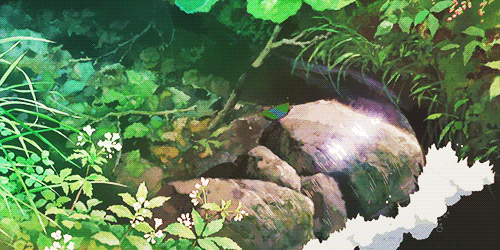
#solarpunk#colonialism#anti colonialism#decolonize#decolonisation#no justice no peace#indigenous rights#land back#first nations#social justice
189 notes
·
View notes
Text
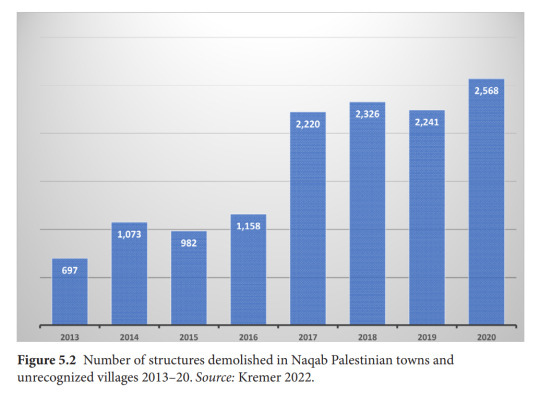
"In the on-going Nakba, Israeli government policymakers and forces continue to destroy homes and even entire villages. During the period 2013–20, some 13,265 structures were demolished in Naqab Palestinian communities. The rate of destruction has increased over the years, including in the COVID-19 pandemic year of 2020, during which 2,568 structures were demolished. This represents an increase in annual demolitions of 268 per cent since 2013. In addition, the Israeli governmental and non-governmental forces (e.g., the Jewish National Fund [JNF]), continue to oppose Naqab Palestinians’ making the desert bloom. The NGO, Negev Coexistence Foundation documented the destruction of approximately 14,500 dunams of crops planted by Naqab Palestinians in 2021.
The government has also restarted its pre- and early-state practice of demolishing entire Palestinian villages. One such village, Al-Araqib, represents a particular threat because it is a story of displaced Naqab Palestinians moving back to their ancestral lands and re-establishing their village. This village, established in the early 1900s, was depopulated by the Israeli military government in 1953, when all inhabitants were evacuated, ostensibly for six months in order to use the land for military training. The Israeli authorities, however, never allowed the Al-Araqib villagers to return, and eventually they resettled in Rahat, while continuing to register claims for their land, to use it for grazing and agriculture (though crops were repeatedly destroyed by the authorities), and bury their dead in the village cemetery. In 1998, around fifty Bedouin families decided to return to al-Araqib to live on their land, when an operation by the JNF to plant trees on their land was initiated. Like other unrecognized villages, Al-Araqib has no modern services or infrastructure, and has been repeatedly subjected to demolitions, threats and arrests by Israeli authorities.
On 27 July 2010, the entire village was demolished by the state, including olive trees and livestock. When the UN Human Rights Council questioned the Israeli government about the demolition of this village in 2011, it maintained a staunchly settler-colonial denial of indigenous land rights, stating that ‘the so-called El-Arkib village was simply an act of squatting on state owned land. The individuals never had ownership over this land.’ The people of Al-Araqib rebuilt their village and have staunchly refused to leave. Since then, as of 25 January 2022, the village has been demolished another 197 times, often with the Israeli forces also destroying, burying or confiscating the wood and tin building materials to try to prevent the residents from using them to rebuild Al-Araqib again. These serial demolitions have also resulted in many injuries and arrests, and state authorities have sued the families for over a million shekels (~US $330,000) to cover the costs of the demolitions."
Ismael Abu-Saad, “Al-Naqab: The Unfinished Zionist Settler-colonial Conquest of its Elusive ‘Last Frontier,’ and Indigenous Palestinian Bedouin Arab Resistance,” in Decolonizing the Study of Palestine: Indigenous Perspectives and Settler Colonialism (2023)
48 notes
·
View notes
Note
Scuttling into ur askbox like a little beetle
i think i recall you reblogging/posting things about geography and culture + human effect on it - I vaguely recall a piece of art where it showed a blurred out, cropped piece of people fighting, and focused instead on the flora in the scene.
ANYWAY! getting back on track. seeing that piece inspired me to take a course this semester called "people and the land: cultural geography". and the whole reason I came to your askbox was to ask if you had any suggested reading materials? We'll get stuff in class ofc, but I am curious to see if there's any bias of materials on the prof's side vs someone else.
Phew that was a long ask. thank you o/!
That sounds like Liz Anna Kozik’s piece : D So happy it stuck with you! I love her work!!
As for your ask, what an awesome class! Land-human relationships are my bullshit, and I really enjoyed my own cultural geography class.
Thinking back on my schooling, I would say about 70% of my classes fell in with the “everything is awful and humans are the worst” narrative, and the other 30% made time for land-human relationships other than the extractive hellscape that most people currently live under. So, full disclosure, when I think of “bias,” that’s what I think of. You grow up in the miasma, it’s hard to imagine that there’s any other way of living. It’s also hard to say without knowing the professor, but I think, in general, it’s good to be mindful of who is or isn’t telling the story.
ANYWAY. All that in mind, here’s some articles about people-land relations that I think are neat:
The Environment and Society portal - I like their digital exhibits especially. I remember enjoying Oceans in Three Paradoxes and The Northwest Passage. Great place to wander around and pick a random article that catches your eye.
Of Deserts and Decolonization: Dispelling Myths About Drylands – obligatory desert propaganda. An article looking at how colonial mindsets about deserts disrupt existing relationships and hurt both people and land, and also how those attitudes shape environmentalism/conservation/etc. still today.
The Miracle of the Commons – lovingly challenging the Tragedy of the Commons with a creative solution to poaching and human-animal conflict in South Africa, Zimbabwe, and Namibia. Great article to sit in discomfort about (productively!)
Biodiversity: The Variety of Life that Sustains Our Own – Contains one of my go-to examples when explaining how humans can be good for land and biodiversity, the story of Quitobaquito Springs (and its sister spring Ki:towak, though the author doesn’t mention it here.)
The Environmental History Timeline - just fun to look at, especially the further you go back. It’s funny to spot where a young branch of history is trying *really hard* to reframe how academia thinks about the past, by bringing the invisible landscape forward:
2700 BCE — Epic of Gilgamesh describes vast tracts of cedar forests in what is now southern Iraq. Gilgamesh defies the gods and cuts down the forest, and in return the gods say they will curse Sumeria with fire (or possibly drought). By 2100 BCE, soil erosion and salt buildup have devastated agriculture. One Sumerian wrote that the “earth turned white.” Civilization moved north to Babylonia and Assyria. Again, deforestation becomes a factor in the rise and subsequent fall of these civilizations. (Perlin, 1991).
2700 BC — Some of the first laws protecting the remaining forests are decreed in Ur, Messopotamia. (Grove, 1995).
^^^ fucking around and finding out forever and ever and ever.
#thank you for reaching out! I hope you enjoy your class!#i hope i understood this correctly and that these are helpful. and if not. well. there was an attempt 🤪#love this land#for science
87 notes
·
View notes
Text
[F]armers have self-initiated practices of decolonization through campaigns to unionize agriculture. Working through the Gaza branch of the Union of Agricultural Work Committees (UAWC) which represents local agricultural committees in rural and urban areas as well as refugee camps, farmers along the eastern 'border' work to ensure access to land and natural resources to maintain their livelihoods. UAWC also supports farmers by facilitating access to agricultural tools and expertise for Gazan farmers living under occupation to develop new cultivation practices that respond to the demands and pressures of neo-liberal markets and climate change. Whether it is the introduction of new and previously foreign crops into Gaza, like pineapple and broccoli, or the building of novel infrastructure for cultivation, like the hanging strawberry farms of Beit Lahiya, UAWC works with farmers to produce more sustainable solutions in agriculture to counters the export blockade regular encroachment on their lands and water scarcity in the strip. As a direct challenge to Israeli eco-colonial practices, and despite having no affiliation with Palestinian political factions, UAWC was designated as a 'terrorist organization' by the Israeli Ministry of Defense in November 2021, alongside five other leading Palestinian human rights organizations. Despite international condemnation of this outrageous designation, the work of UAWC has become increasingly stigmatized, also putting pressure on their ability to garner international funding.
Shourideh C. Molavi, Environmental Warfare in Gaza: Colonial Violence and New Landscapes of Resistance
14 notes
·
View notes
Text
i’m not sure why tuck and yangs “decolonization is not a metaphor” is used to counter attempts at real material change towards decolonization (i.e, veganism). i can’t imagine anything more non-metaphorical than concrete, immediate changes in our material relationships (which veganism facilitates). there is no metaphor here. when animal agriculture was and still is a main driver and justification of colonialism, we don’t have time for these ideological claims. i would assume tuck and yang, if they are genuine in their insistence on non-metaphorical decolonization, would disprove of this application of their quote
9 notes
·
View notes
Text
It's so fucking frustrating having to constantly debunk claims that vegan alternatives are worse for the environment
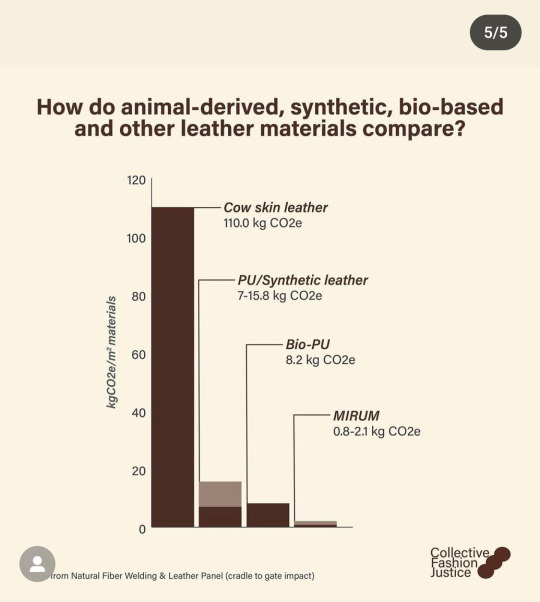
when that's not even the point of veganism.
We are talking about taking a life away, just because humans have decided they are entitled to someone else's body parts. Literally ending a life because humans have deemed an non-human animal not worthy of deciding what should happen to their own body.
This is about bodily autonomy and consent. YOU, colonizer, are owed NOTHING. Nothing except that which you create belongs to you. You are not entitled to other's belongings or body parts. You are not entitled to kill others because your life is worth more. You are not special, you are not valuable, any more than the nonhuman you are killing is. It is christian religious ideology to view nonhuman animals as separate and lesser than us. Nonhumans are just as evolved as we are. They can live longer than us. They can have more senses than us. They can communicate in ways we don't understand. They contribute much more positively to their ecosystems than us.
Humans are not the chosen special child of Earth who are allowed to do whatever we want because we are strong enough to massacre every other species, or even humans we deem "lesser" (such as in ongoing genocides and colonization). That is extreme right wing "Might Makes Right" ideological thinking, and is not the basis of a healthy, equitable, sustainable lifestyle or ecosystem.
We are one small part of the ecosystem and colonizer mentality of kill & take has had disastrous effects on humans, ecosystems, and nonhumans. This isn't the way forward. It's backwards.
Vegans are asking for everyone to stop viewing the earth and her inhabitants as things to be taken from and start viewing them in a more decolonized way. We are part of the ecosystem and we have a responsibility to foster it and tend to it as much as we can.
Animal agriculture is unnatural, cruel, and unnecessary. It pollutes our air, our waters, and our soil. Cow Ranches are cutting down native indigenous forests so people can eat burgers and wear leather. And there is a dead being attached to every single one of those unnecessary purchases.
A being that didn't have to die, that shouldn't have even been born into slavery in the first place. The real victim in all of this, who lose their lives and have their bodies desecrated afterwards. That's what we want to end.
17 notes
·
View notes
Text
The original artist never receives any credit outside of the scientific community simply because they are Black Africans who were the first humans on earth to write in art before text writing which is also of African origin but discredited by misinformation of trying to give credit to modern day Iraq as if we are not the same people who migrated out of Africa.
You have to be one sick and disturbed minded individual to hate someone so much that you refuse to label them smarter than yourself. I'm not like most Black Indigenous People living today because I don't recognize whiteness or anything else because I know that all humans share a common link and we are all the same.
I don't believe in repeating the narrative of whiteness because it's a social construct and down right stupid to believe in something that doesn't exist. I'm a realistic person and I live in a natural world based on evidence and evolutionary biology because the earth supplies irrefutable evidence of how everything on earth formed and evolved over time.
I'm a scientist and I think as a scientist, not as a Black Indigenous Man who is indoctrinated to believe in lies and impossibilities. I don't have time for such nonsense. Scientific Racism is the most stupid shit I have ever seen in my entire life and yet so many Black Indigenous People globally who are harmed by this stupid shit embracing it as truth even though this rubbish dehumanizes everything Black and Indigenous.
I refuse to embrace something that destroys me as being human and I truly try my best to get other Black Indigenous People globally to see the same thing as me. I get tired of hearing about slavery every time someone is talking about Black Indigenous People History as if our only history on earth is surrounded by slavery.
Americans keep saying that they got here on slave ships and the 1619 project even though some Indigenous People arrived here in the 1400s and we have proof of this in the Library of Congress. Historians lie about Black Indigenous People History because it creates a revealing fact that they lied to everyone about Black Indigenous People History.
Most of you have never read "The Bell Curve" which talks about colorism and low IQs for Black Indigenous People globally even though our Black Indigenous People History debunks this myth. This is why knowing Black Indigenous People History is essentially important to decolonize the many negative lies and stereotypes that have been bestowed on Black Africans and Black Indigenous People History worldwide.
Not one of you seems to understand what I am trying to do on Tumblr which is something that all Black Activists have been trying to do and that's Black Unification and oneness; something that we have never had since the dawn of agriculture.
Many of you glorify whiteness as if it's real and I can prove to you that it isn't. Scientific Racism started the classification of humans based on skin colors to justify slavery and nothing else. In America white people didn't exist before Bacon's Rebellion.
8 notes
·
View notes
Text
There was this post I saw about decolonization and environmentalism and the possible future of the great plains. I can't find it but we should consider the fact throughout the thousands of years of indigenous environmental engineering the great plains have grown and shrunk by thousands of miles to suit socioeconomic and food needs throughout history, primarily agriculture, trade routes, and bison hunting.
3 notes
·
View notes
Note
i mean as an indigenous person, the domari people and the armenian diaspora in palestine are just as indigenous as palestinians. indigneity is produced via a relationship to an oppressive, colonizing entity, not "who lived here the longest"
I don't disagree with you exactly, but colonization is also layered.
So bear in mind that my knowledge of decolonization is specifically subaltern (as in the Indian subcontinent) and patchy (disabled my whole adult life and a very start-stop-stagnate tertiary education). The Americas might be different. I'm completely open to being wrong.
In Sri Lanka, the Sinhalese and Eelam Tamils are "natives" while "indigenous" are considered the Adivasi and Tamil Indigenous people in the North (I'm sorry I can't remember their names, only found out about them last year). The distinction arises because they were Austroasiatic people (and the Tamils were maybe Dravidians? Wow, ethnosupremacist black hole discovered) who arrived in migrations millennia before they were colonized by later migrants from the Indian subcontinent about 2500 years ago. Those are the progenitors of both the later Sinhalese and Tamil kingdoms. (Obviously both intermarried with the indigenous populations; ethnic identities are cultural). The Adivasi never assimilated into the Indian migrants' agrarian societies. They still engage in hunting and subsistence agriculture rooted in the ecosystems of their ancestral lands. Unlike the rest of the population, being transplanted from these lands to anywhere else in the country would result in a devastating loss culture and community.
"Indigeneity" is an extremely fraught topic in post-colonial nations when conflated with being "native". It erases the actual pre-agrarian tribes that were victims of colonization two or three times over, and is used for nationalist ethnic cleansing and the creation of ethnic underclasses. The myth that all Tamils were descendants of "Chola invaders" that arrived only a thousand years ago is foundational to Sri Lanka's Tamil genocide. Eelam Tamils themselves heavily discriminated against the Malaiyyah Tamils the British enslaved and exported from India to work their cash crops (Indian Ocean slavery is as brutal and horrific as the trans-Atlantic one). The persecution of Muslims who migrated here the last few centuries from South India, Afghanistan, Turkey and Malaysia also involves seeing them as interlopers, even though they never claimed to be native because their ethnic identities are shaped by their migrant roots and the unique ways they assimilated into Sri Lankan society. They still have ancestral lands here from which they've been ethnically cleansed and are still under threat by both Sinhalese and Tamils.
I'm not sure whether this is something unique to countries where the Europeans actually did fuck off forever. But if even if they never did, how do we discern our layers of colonization and oppression if we all believe we're indigenous? Do we ignore that the pre-agrarian societies* here are rooted primarily in the custodianship and protection of their ancestral lands, unlike the rest of us that thrive in mono-agriculture, industrial encroachment and urban sprawl (and constant ethnic violence)? Do we have to center European violence in our own understanding of ourselves and our responsibilities to acknowledge the histories and rights of minorities vulnerable to us?
To my understanding, the difference between "anti-colonial" and "decolonial" is that one is conceptualized as "resistance" and the other as "re-existence". What I've been taught is that seeing our place in the world through the white colonial lens and defining ourselves by colonial proximity is to give up our power of self-determination. We were native to this island before these violent borders imposed on us by the British ever existed, and we were native whatever kingdoms configured and reconfigured themselves over millennia. But we have also been violent colonizers of the people who were here before us, even during and after the Europeans came and went. Indigeneity afaik is acknowledging their identities and respecting the history that formed them, and the restoration of their long-obscured sovereign right to their lands independent of the nation state.
*I can't remember whether pre-civilization was a problematic term or not. I took like two modules on subaltern indigenous peoples five years apart lol.
#knee of huss#decolonization#indigenous rights#indigenous peoples#anarchism#i'm sorry but you have to be an anarchist to be decolonial#indigenous#sri lanka#subaltern#asks#anon
5 notes
·
View notes
Text
The notion that humans, especially Indigenous humans, must be removed from nature in order to save it, and that “pristine wilderness” must be quarantined from an inherently destructive humanity has its historical roots in white supremacy. When European colonists arrived in North America, they did not recognize the active management of ecosystems by Indigenous groups as “agriculture.” As Indigenous people lived on but did not “steward” the land in a capitalist sense, the land was viewed as a “virgin wilderness” being “wasted” on “unproductive” peoples. Their dispossession was therefore legitimated by God, who had “given” the land to European settlers to tame and cultivate. Such notions were invoked during the foundation of the United States, and have been used by the religious right in Israel to justify the ongoing expropriation of Palestinian territory.
Of course, the Indigenous people of the Americas, like Indigenous people all over the world, were engaged in active management of the ecosystems in which they lived and in cultivation of resources to support their societies. Advanced agricultural techniques like prescribed burning were used to encourage the growth of gardens of edible food within old growth forests or prairies, just as the purposeful management of Bison and other game stood in for (arguably much crueler) European-style animal husbandry. These practices of cultivation were alien, and indeed invisible, to European eyes.
591 notes
·
View notes
Text
WHERE I’M AT
PRO:
Disability-activism-informed environmentalism
Inside growing
Collective action
Gardening for the rest of us
Farmer’s markets
Small-scale agriculture
future food
hope on purpose
land back + decolonization
physical media
right to repair
mycology
green death practices
right to privacy + digital privacy
abolition (both cops and prisons)
transformative justice
an ad-free future
local community
foraging
sci-fi aesthetics and movements that allow us to imagine a better future, including solarpunk and afro-futurism
a more equitable, inclusive future
better ways of giving money and running non-profits
hearing and thinking about voices from across futurist movements
understanding how the news media cycle and current news climate and culture impact our understanding of the world
Ursula K. Le Guin, adrienne maree brown, Octavia Butler, Rebecca Solnit, Robin Wall Kimmerer
INTERESTED IN:
Space travel, both private and state-sponsored, with an optimistic but critical eye
all sorts of sci-fi and sci-fi aesthetics
the impact of nature on the human brain, and humans’ connection to nature
fixing effective alturism
nature and STEM education
alternative and hypothetical political models
expanding my understanding of environmentalism from a disability-justice-informed perspective
WARY OF:
greenwashing
perfectionism, “one size fits all”, and uncompassionate views on personal environmental responsibility
eco-facism
non-intersectional eco-activism
BOOKS AND RESOURCES:
News + Publications:
Future Crunch (bi-weekly optimistic newsletter)
YES! magazine (”solutions journalism”)
Science, Food, Nature, Foraging
Best American Science and Nature Writing from the past few years
Forager’s Harvest by Samuel Thayer
Entangled Life by Merlin Sheldrake (mushrooms!)
How to Keep House While Drowning by KC Davis (among other things, covers how to balance environmental ideals with accessibility needs)
Nonviolent Communication by Marshall Rosenberg
Trauma Stewardship: An Everyday Guide to Caring for Self While Caring for Others by Laura van Dernoot Lipsky (explicitly covers environmental grief)
Peacebuilding + Transformational Justice + Surviving in this century
Emergent Strategy by adrienne maree brown
Range: Why Generalists Triumph in a Specialized World by David Epstein
Racism and Decolonization
Decolonization Is Not A Metaphor
White Fragility by Robin Diangelo
An Indigenous Peoples’ History of the United States by Roseanne Dunbar Ortiz
ON MY TO-READ LIST:
Pleasure Activism by adrienne maree brown
more Butler and Le Guin
All We Can Save by Ayana Elizabeth Johnson
21 notes
·
View notes
Text
Settlers are not immigrants. Immigrants are beholden to the Indigenous laws and epistemologies of the lands they migrate to. Settlers become the law, supplanting Indigenous laws and epistemologies. Therefore, settler nations are not immigrant nations. (See also A.J. Barker, 2009).
Not unique, the United States, as a settler colonial nation-state, also operates as an empire utilizing external forms and internal forms of colonization simultaneous to the settler colonial project. This means, and this is perplexing to some, that dispossessed people are brought onto seized Indigenous land through other colonial projects. Other colonial projects include enslavement, as discussed, but also military recruitment, low-wage and high-wage labor recruitment (such as agricultural workers and overseas-trained engineers), and displacement/migration (such as the coerced immigration from nations torn by U.S. wars or devastated by U.S. economic policy). In this set of settler colonial relations, colonial subjects who are displaced by external colonialism, as well as racialized and minoritized by internal colonialism, still occupy and settle stolen Indigenous land. Settlers are diverse, not just of white European descent, and include people of color, even from other colonial contexts. This tightly wound set of conditions and racialized, globalized relations exponentially complicates what is meant by decolonization, and by solidarity, against settler colonial forces.
Decolonization in exploitative colonial situations could involve the seizing of imperial wealth by the postcolonial subject. In settler colonial situations, seizing imperial wealth is inextricably tied to settlement and re-invasion. Likewise, the promise of integration and civil rights is predicated on securing a share of a settler-appropriated wealth (as well as expropriated ‘third-world’ wealth). Decolonization in a settler context is fraught because empire, settlement, and internal colony have no spatial separation. Each of these features of settler colonialism in the US context - empire, settlement, and internal colony - make it a site of contradictory decolonial desires.
- Eve Tuck & K. Wayne Yang, Decolonization is not a metaphor (2012)
#settler colonialism#decolonisation#decolonization#land back#decolonization is not a metaphor#lukemisiani
2 notes
·
View notes
Text
just thinking about how ppl think I'm stupid bc of a limited perception... I have multiple dimensions. people I know irl don't even know the scope and depth of the work i do. when ppl get a glimpse of it, they're overwhelmed bc it's overwhelming to explain. on here, I talk about zoros butthole. irl I talk about sustainable and responsible agriculture and micro ecosystems and forest stewardship and anarchy&decolonization and I organize with the community and with the tribe and do construction and electrical and lots of science. I have to do lots of science. not only that, besides geology, I'm all self taught. people have so many dimensions.
#i also grew up a bad kid who sold drugs and partied#and did things youd see in euphoria#so i have like... real smarts on top of book smarts#i was poor and know how to work the system completely#i mean#so many ppl think im dumb#and then when i get moments to prove jm not#they get like.... mad at me......#im also emotionally intelligent and very empathic#idk#im a genius and so is zoro#but we are meant to highlight those around us
9 notes
·
View notes